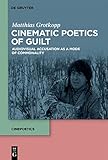Cinematic Poetics of Guilt : Audiovisual Accusation as a Mode of Commonality / Matthias Grotkopp.
Material type: TextSeries: Cinepoetics – English edition ; 9Publisher: Berlin ; Boston : De Gruyter, [2021]Copyright date: ©2021Description: 1 online resource (VIII, 257 p.)Content type:
TextSeries: Cinepoetics – English edition ; 9Publisher: Berlin ; Boston : De Gruyter, [2021]Copyright date: ©2021Description: 1 online resource (VIII, 257 p.)Content type: - 9783110605112
- 9783110611298
- 9783110612110
- 791.436
- online - DeGruyter
- Issued also in print.
| Item type | Current library | Call number | URL | Status | Notes | Barcode | |
|---|---|---|---|---|---|---|---|
 eBook
eBook
|
Biblioteca "Angelicum" Pont. Univ. S.Tommaso d'Aquino Nuvola online | online - DeGruyter (Browse shelf(Opens below)) | Online access | Not for loan (Accesso limitato) | Accesso per gli utenti autorizzati / Access for authorized users | (dgr)9783110612110 |
Frontmatter -- Author’s Note -- Contents -- Introduction -- Part 1: Theoretical Positions -- 1 Feeling and Morality in the Cinema -- Part 2: Affective Dramaturgies of the Sense of Guilt -- 2 The Present: German Post-War Cinema and Guilt Reorganized -- 3 The Past: Hollywood Genre Poetics -- 4 The Future: Global Responsibility and the Rhetoric of Climate Change -- 5 Conclusion: The Cinema’s Guilty Conscience -- Bibliography -- Filmography -- Name Index -- Film Index
restricted access online access with authorization star
http://purl.org/coar/access_right/c_16ec
How do the temporal and dynamic patterns of media forms and practices create complex constructions of meaning, identity and value? How can we describe the way cinematic images generate and transform the affectively grounded structures that survey, confirm or revise a political community’s horizon of values? Using the exemplary case of feelings of guilt, the author develops an approach that makes patterns of audiovisual compositions intelligible as aesthetic modulations of moral feelings. A sense of guilt is presented here as neither an individualistic psychological emotion nor an external social mechanism of control but as a paradigmatic case for understanding politics and history as based upon embodied affectivity and shared relations to the world. By taking three distinct examples – German Post-War cinema, Hollywood Western and films on climate change – patterns of audiovisual composition and the inherent calculation of affect are analyzed as practices shaping the conditions of possibility of political communities and their historicity.
Issued also in print.
Mode of access: Internet via World Wide Web.
In English.
Description based on online resource; title from PDF title page (publisher's Web site, viewed 25. Jun 2024)


